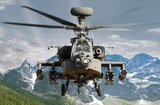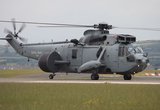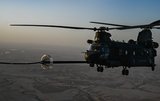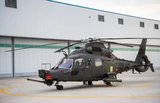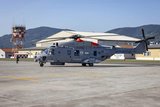Cherry Point's 'Pedro' trains for emergency situations
Marine Transport Squadron 1 is an emergency rescue squadron that trains two or three times a week.
Affectionately known as ‘Pedro’ because of its main mission, which is search and rescue, Pedro is a world-wide term for SAR teams.
Much of the training Pedro conducts simulates emergency situations where landing is impossible due to water, debris or trees.
“We perform this training exercise to qualify new members to our unit or to requalify members who have out-dated qualifications,” said Sgt. Phillip W. Cambron, search and rescue crew chief for VMR-1.
Cambron went on to say that many Pedro team members deploy on a rotational basis, so this training is imperative. The missions Pedro conducts in garrison differ greatly of that when they’re in a combat zone.
After each deployment, Marines and Sailors participate in different training scenarios as a way to reiterate basic skills and to familiarize them with any new equipment.
During deployments, Pedro is used as a medical evacuation team … much more than a search and rescue team.
“About the only times we did SAR work while I was deployed was during the training and requalification times,” said Petty Officer 2nd Class Ryan E. Honnoll, a VMR-1 search and rescue medical technician.
“I feel this training is important because it keeps our skills up to be prepared for real life situations that may arise,” said Petty Officer 3rd Class Tyler R. Welch, a VMR-1 search and rescue medical technician.
“The whole process we go through to evacuate a patient is a methodical one,” said Welch. “The phrase ‘slow is smooth and smooth is fast’ is one we live by. The most challenging thing about the process is communication.”
When the ground crew needs its next piece of equipment it will use hand and arm signals to communicate to the crew chief what they need.
“The training that we do is very important,” said Honnoll. “If you don’t use your skills, you lose your skills.”
By Pfc. Cory D. Polom, Marine Corps Air Station Cherry Point
More from Defence Helicopter
-
![Germany to send WS-61 Westland Sea King helicopters to Ukraine]()
Germany to send WS-61 Westland Sea King helicopters to Ukraine
Germany has committed to sending Ukraine six of its 21 retiring WS-61 Westland Sea King multirole, amphibious helicopters.
-
![Boeing secures $271 million to advance modernisation of US Special Operations' MH-47G Chinook]()
Boeing secures $271 million to advance modernisation of US Special Operations' MH-47G Chinook
Boeing has clinched a major contract modification to further its backing of the US Special Operations Command’s MH-47G Chinook aircraft modernisation effort.
-
![Dubai Airshow 2023: South Korean homegrown helicopters make international debut]()
Dubai Airshow 2023: South Korean homegrown helicopters make international debut
Two KAI helicopters, the KUH-1E utility helicopter and the Light Attack Helicopter (LAH), have taken centre stage at the Dubai Airshow 2023.
-
![Italian Navy receives final NH90 helicopter]()
Italian Navy receives final NH90 helicopter
The Italian Navy now boasts a fleet of 56 NH90 helicopters comprising 46 SH-90As and 10 MH-90As.
-
![Argentina seeks AW109 and CH-46 Sea Knight helicopters]()
Argentina seeks AW109 and CH-46 Sea Knight helicopters
The Argentinian Air Force (FAA) and the Argentinian Naval Aviation Command (COAN) are looking for options to upgrade their helicopter fleets.
-
![DSEI 2023: Lockheed to produce about 40% of Black Hawks on UK soil if it wins NMH contest]()
DSEI 2023: Lockheed to produce about 40% of Black Hawks on UK soil if it wins NMH contest
Lockheed Martin promises a boost to the British job market and export opportunities, while strengthening ties with Poland and positioning the UK for a future in rotorcraft technology in the event of a New Medium Helicopter competition triumph.












